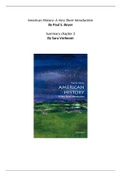American History: A Very Short Introducton
By Paul S. Boyer
Summary chapter 2
By Sara Verboom
, American History: A Very Short Introducton by Paul S. Boyer Chapter 2
Summarised by Sara Verboom
Chapter 2
1763-1789: Revoluton, Consttuton, a nene naton
The Britsh had won the Seven Years War, but they didn’t just gain land. They
gained lots and lots of debts. Britsh Parliament decided to extract more
revenue from the colonies. According to Parliament, this only seemed fair,
since their army had defeated the colonist’s French foes. So the colonists were
to pay more taxes. Litle did the Britsh Parliament know that this decision
would lead to the American Revoluton.
In 1674, Parliament passed the Sugar Act. Next came the Stamp Act in 1765.
Later in 1765, the Quartering Act was passed.
The colonists weren’t happy with these extra taxes, because they lacked
representaton in the Britsh Parliament. No one to speak for them. “Taxaton
without representaton”, they called it.
In October 1765, delegates from 9 colonies met in New York City. This “Stamp
Act Congress” decided to deny Parliament’s right to tax the colonies. Their
protest led to the repeal of the Stamp Act in 1766, but Parliament passed a
“Declaratory Act” instead, to show their power over the colonists.
A response to Parliament’s actons came from Boston’s Samuel Adams. He
denounced Parliament’s actons and, as a member of the Sons of Liberty (an
organizaton originally formed to oppose the Stamp Act) he opposed
Parliament. In 1968, a Boston mob atacked customs ofcials who had seized
the ship of merchant John Hancock. This atack led to Parliament’s repealing
most of the Townshend Dutes in 1770. The tax on tea, however, was stll very
high.
Britain sent troops to Boston to maintain order, but order was nowhere to be
found in Boston. On March 1770 some Boston protesters were atacked by
Britsh soldiers. Five were killed. This “Boston Massacre”, fuelled by Boston’s
silversmith Paul Revere’s engraving, angered the colonists.
The Britsh Parliament passed the Tea Act in 1773, suggestng it would help the
East India Company to get rid of its lefover tea. This meant that local
merchants in the colonies were undermined in their tea trade. Again, this
angered the colonists. On the night of December 16, 1773, ffy Boston men
dressed up as Mohawk Indians and boarded a Britsh ship. The rebels threw





